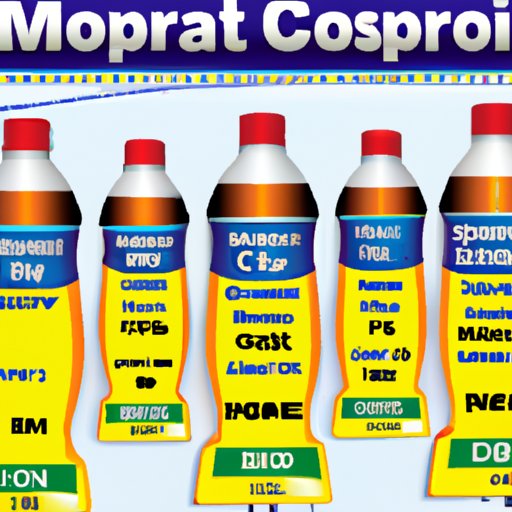Introduction
Corn syrup is a type of liquid sweetener made from corn starch that is used in food products such as candy, baked goods, ice cream, and soft drinks. It is often used as an inexpensive alternative to sugar and other sweeteners due to its low cost and long shelf life. But is it healthy? In this article, we will explore the pros and cons of corn syrup and investigate whether it is a healthy addition to our diets.
Evaluating the Pros and Cons of Corn Syrup as a Sweetener
When it comes to corn syrup, there are both advantages and disadvantages to consider. Let’s take a look at each in more detail.
Advantages
One of the main advantages of corn syrup is that it is much cheaper than other sweeteners. It is also easier to store, since it doesn’t need to be kept refrigerated like some other sweeteners. Corn syrup is also very versatile and can be used in a variety of recipes. Lastly, it has a longer shelf life than other sweeteners, which makes it a great choice for commercial food producers.
Disadvantages
On the flip side, there are some drawbacks to using corn syrup. It is high in calories and sugar, which can contribute to weight gain and other health issues. It also lacks essential vitamins and minerals, so it is not providing any nutritional value. Lastly, it has a distinct taste that may not be appealing to everyone.
Understanding the Nutritional Value of Corn Syrup
Now let’s take a closer look at the nutritional value of corn syrup. One tablespoon (15 ml) of corn syrup contains 60 calories and 14 grams of sugar. It does not contain any vitamins or minerals, so it is not providing any nutritional benefit.

Examining the Health Risks Associated with Corn Syrup Consumption
Consuming too much corn syrup can lead to a number of health issues. Here are some of the most common:
Obesity
Since corn syrup is high in calories and sugar, it can contribute to weight gain. This can increase the risk of obesity and associated health problems such as heart disease and diabetes.
Diabetes
Corn syrup is high in simple carbohydrates, which can cause spikes in blood sugar levels. Over time, this can increase the risk of developing type 2 diabetes.
Tooth Decay
The high sugar content of corn syrup can lead to tooth decay if consumed in excess. This can cause cavities, gum disease, and other dental issues.

Investigating How Corn Syrup Compares to Other Sweeteners
Let’s compare corn syrup to some other popular sweeteners to see how it stacks up.
Natural Sweeteners
Natural sweeteners such as honey, maple syrup, and agave nectar are all healthier alternatives to corn syrup. They are lower in calories and sugar, and they contain beneficial vitamins and minerals. However, they are typically more expensive than corn syrup and may have a shorter shelf life.
Artificial Sweeteners
Artificial sweeteners such as aspartame and saccharin are low in calories and sugar, but they may have adverse effects on health. Studies have linked them to an increased risk of cancer, so they should be consumed in moderation.
Exploring the Health Benefits of Corn Syrup
Despite its drawbacks, corn syrup does offer some potential health benefits. Here are a few to consider:
Energy Source
Corn syrup is a source of quick energy due to its high sugar content. This can be beneficial for athletes who need an energy boost during workouts or competition.
Prebiotics
Corn syrup contains prebiotic fibers, which help promote the growth of beneficial bacteria in the gut. This can improve digestive health and boost immunity.

Analyzing Labels for Hidden Sources of Corn Syrup
Many processed foods contain hidden sources of corn syrup, so it is important to read labels carefully. Here are some tips for identifying corn syrup in products:
Common Sources
Corn syrup can be found in a variety of products, including breads, cereals, condiments, sauces, and desserts. It can also be listed under different names, such as glucose-fructose, dextrose, and high-fructose corn syrup.
Tips for Identifying Corn Syrup in Products
Look for terms such as “corn syrup”, “glucose-fructose”, “dextrose”, and “high-fructose corn syrup” in the ingredients list. Also, check the nutrition facts panel for added sugars, as these can be derived from corn syrup. Be aware that some products may use a combination of different sweeteners, so it is important to read the whole label.
Conclusion
In conclusion, corn syrup is a common sweetener that is used in many food products. While it does have some advantages, such as being cheap and easy to store, it is high in calories and sugar and can contribute to health issues such as obesity and diabetes. Additionally, it lacks essential vitamins and minerals and has a distinct taste that may not be appealing to everyone. Natural sweeteners and artificial sweeteners are healthier alternatives, but they come with their own set of drawbacks. When consuming foods containing corn syrup, it is important to read labels carefully and identify hidden sources of the sweetener. Overall, corn syrup should be consumed in moderation to avoid potential health risks.
(Note: Is this article not meeting your expectations? Do you have knowledge or insights to share? Unlock new opportunities and expand your reach by joining our authors team. Click Registration to join us and share your expertise with our readers.)
